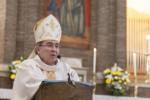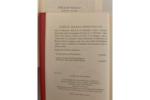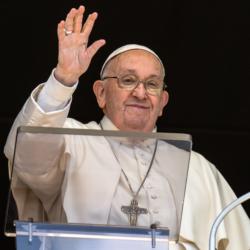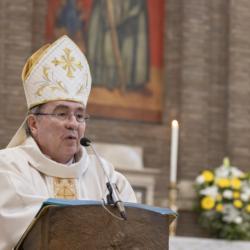Code of Ministerial Behavior promulgated
Fulfilling a mandate from the United States Conference of Catholic Bishops (USCCB), Archbishop Seán O’Malley promulgated the Code of Ministerial Behavior, detailing “standards of behavior and appropriate boundaries” between priests, religious and archdiocesan employees and children. Archbishop O’Malley issued the code on Oct. 17; it becomes effective Oct. 24.
Under the Charter for the Protection of Children and Young People issued by the USCCB, each diocese must have a “clear and well publicized” standard of ministerial behavior for clergy and Church employees. The Code of Ministerial Behavior will be added to Article II of the archdiocesan Policies and Procedures for the Protection of Children, “Safe Environment Programs.”
The code for the Archdiocese of Boston provides a set of standards of “acceptable, legal, professional and responsible” behavior for all adults who work with children and youth on a regular basis, explained Deacon Anthony Rizzuto, director of the Office of Child Advocacy, Implementation and Oversight. Deacon Rizzuto drafted the initial version of the code, which was then reviewed and updated before being promulgated.
He said that the code also includes standards of conduct “with regards to sexual abuse and harassment,” and emphasizes that, whenever possible, adults should avoid being alone with children. Priests, deacons, pastoral ministers, administrators, staff, employees and volunteers in archdiocesan parishes, religious communities, institutes and organizations must abide by the Code of Ministerial Behavior. Ministerial volunteers will be required to sign and return a form to the archdiocese, stating they have read the code and will follow its standards.
The code is issued ad experimentum, a Latin term meaning ‘for temporary or provisional use,’ and will be enforced “as is” for one year. During that time, the archdiocese’s Implementation and Oversight Committee, the Review Board, the lay faithful, clergy and religious will be consulted as to whether revisions are necessary.
Deacon Rizzuto described the archbishop’s decision to issue the code ad experimentum as “unique.”
"During that year, he wants to take the initial code and have it reviewed more extensively and have that review really informed by the experiences of people in the parishes and the schools and the institutions," explained Deacon Rizzuto.
A permanent code will be adopted within one year of its effective date, Oct. 24.
As part of the promulgation process, a copy of the code will be sent to clergy, archdiocesan personnel and volunteers. Pastors and directors of archdiocesan institution will also receive a copy, which they will pass on to their employees and volunteers.
A letter written by Archbishop O’Malley will accompany the Code of Ministerial Behavior sent to the aforementioned groups.
In the letter, the archbishop states that the Code of Ministerial Behavior is based in part on a code of pastoral conduct, published by the National Catholic Risk Retention Group, creators of the Protecting God’s Children program. The USCCB recommended the group’s “Model Code of Pastoral Conduct,” as a guide to the archdiocese’s Code of Ministerial Behavior.
The archbishop went on to state that Archdiocese of Boston did not simply adapt the “Model Code of Pastoral Conduct” but modified it “in accord with insights we have received from the Commission for the Protection of Children and the ‘Boundary Guidelines’ developed by the National Federation for Catholic Youth Ministry.”
He also stated that recommendations from the Implementation and Oversight Committee and the Review Board, who made a preliminary review of the code, were incorporated into the final draft.
Archbishop O’Malley emphasized that “the full process of developing a Code of Ministerial Behavior for the Archdiocese is not yet complete,” but will be finalized after the one-year period of consultation.
"During this coming year, I wish to encourage a broad consultation of this document, a process leading to further review and revision and, ultimately, to a permanent code that is suitable to our archdiocese," he wrote.
The review and re-examination of the code, said the archbishop, is to ensure that the archdiocese has the most competent policy possible.
"Our primary goal remains the protection of children, a goal that requires us to examine and to establish effective standards of awareness, practice and behavior for safe environments in all contexts of the life and mission of our Church," stated Archbishop O'Malley. "Accountability is one of the important provisions in the code; during this coming year I trust that it will be developed further during the consultation."


















